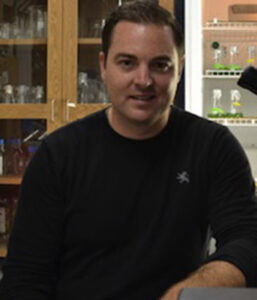PhD: Environmental Health Sciences PHD
The program in environmental health sciences offers graduate study leading to an environmental health PhD.
Students’ experiences incorporate environmental health theories with crosscutting public health competencies such as communication, public health biology, systems-thinking and leadership.
Program Type
Doctoral
Program Format
On Campus
Spotlight on Research
Amy Kalkbrenner uses epidemiologic methods to study how exposures to environmental pollutants during pregnancy cause poor birth outcomes (such as preterm birth) or neurodevelopmental disorders (like autism).
She especially focuses on airborne exposures, such as traffic-related pollutants like fine particulate matter, the hundreds of airborne metals and volatile organic compounds known as hazardous air pollutants, and tobacco smoke.

Faculty for the environmental health degree program are drawn from a number of departments and research units at UWM, giving students an unparalleled opportunity for cross-disciplinary training and novel research projects. Laboratories and equipment are available across campus to promote innovative concepts in issues of environmental health sciences.
PhD Environmental Health Sciences
The PhD in Environmental Health Sciences requires 65 credits beyond the bachelor’s degree. In addition to the PhD Common Core Coursework, credits include required concentration coursework (17 credits), electives (at least 12 credits), and the remaining credits taken as research.
Required Core PhD Courses (12 credits)
| Course | Credits |
|---|---|
| PH 704 Principles and Methods of Epidemiology | 3 |
| PH 711 Intermediate Biostatistics | 3 |
| PH 801 Seminar in Public Health Research | 3 |
| Choose PH 819 Social and Environmental Justice in Public Health | 3 |
| Or | |
| PH 859 Racial/Ethnic Health Disparities in the United States |
Required EHS Track Coursework (17 credits)
| Course | Credits |
|---|---|
| PH 705 Principles of Public Policy and Administration | 3 |
| PH 743 Environmental Risk Assessment | 3 |
| PH 745 Developmental Toxicology | 3 |
| PH 750 Seminar in Environmental Health Sciences | 2 |
| PH 808 Writing a Federal Grant in the Public Health Sciences | 3 |
| PH 821 Advanced Survey of Environmental Health | 3 |
Electives
Electives are divided into three categories (molecular, organismal, and population/environment). The student will take courses relevant to their research in consultation with their major professor.
Molecular Level “S”electives
| Course | Credits |
|---|---|
| BIO SCI 529 Molecular Biology of Microorganisms | 3 |
| BIO SCI 540 Microbial Diversity and Physiology | 3 |
| BIO SCI 564 Endocrinology | 3 |
| CHEM 601 Biochemistry: Protein Structure and Function | 3 |
| CHEM 602 Biochemistry: Cellular Processes | 3 |
| CHEM 604 Biochemistry: Metabolism | 3 |
| BMS 590 Topics in Clinical Laboratory Sciences: Public Health Nutrition and Food Politics | 1-5 |
| BMS 615 Cellular and Molecular Toxicology | 3 |
Organismal Level “S”electives
| Course | Credits |
|---|---|
| BIO SCI 401 Immunology | 3 |
| IND ENG 580 Ergonomics | 3 |
| IND ENG 780 Advanced Ergonomics — Low Back Pain | 3 |
| IND ENG 783 Advanced Ergonomics — Upper Extremity | 3 |
Population Level “S”electives
| Course | Credits |
|---|---|
| PH 721 Introduction to Translational Bioinformatics | 3 |
| PH 741 Environmental Public Health Microbiology | 3 |
| PH 762 Environmental Epidemiology | 3 |
| URBPLAN 662 Public Sector Influence on Real Estate Development | 3 |
| URBPLAN 771 Transportation Policy and Planning | 3 |
| URBPLAN 791 Introduction to Urban Geographic Information Systems for Planning | 3 |
| URBPLAN 792 Using Urban Geographic Information Systems (GIS) for Planning | 3 |
| URBPLAN 794 Internet Geographic Information Systems (GIS) | 3 |
| GEOG 520 Physical Geography of the City | 3 |
| FRSHWTR 506 Environmental Health of Freshwater Ecosystems | 3 |
| GEOG 880 Urban Sustainability | 3 |
| GEOG 945 The Internal Structure of the City | 3 |
Total elective credits must equal at least 12.
Research: PH 990 credits must equal at least 24 credits to graduate.
All courses are subject to change. Consult the Academic Catalog for the most up-to-date information.
PhD Environmental Health Sciences Competencies
PhD Core Competencies
- Formulate and test a hypothesis using basic statistical methods.
- Apply statistical inference to guide research decision-making relevant to public health problems and issues.
- Critically evaluate scientific literature and identify how epidemiological and population health data can be used to answer research questions and inform program development and policy decisions aimed at promoting health equity.
- Demonstrate critical thinking skills necessary for formulating research questions, identifying theory to frame research questions, and identify and employ appropriate methodologies for addressing a public health research question.
- Apply social and environmental justice framework when asking and addressing research questions impacting the public’s health.
Environmental Health Sciences Program Competencies
- Apply public health science theories, principles, and methods when developing and implementing public health programs and research.
- Correlate issues of population diversity and social justice with principles of environmental and occupational health.
- Describe the major environmental and occupational agents and their effects on human populations and the environment.
- Describe genetic, physiologic and environmental factors that affect susceptibility to adverse health outcomes following exposure to common hazards.
- Explain current environmental risk assessment methods.
- Describe approaches for detecting, preventing and controlling environmental hazards that pose risks to human health and safety.
- Identify the general mechanisms and/or modes of action of agents in creating an adverse response to environmental exposures via various routes and doses.
- Develop an original hypothesis and design research studies to test it, and then conduct appropriate research and results synthesis to produce a definitive result.
- Demonstrate acceptable skills in scientific writing and oral presentation to both scientific audiences and the general public.
- Demonstrate knowledge of relevant literature for a selected area of study, including identification of knowledge gaps.
Environmental Health Science Jobs
Many PhD environmental health sciences graduates work for health laboratories at the city, state or national level. Other environmental health science job opportunities exist that look at the intersection of the built environment and human health, such as within the Department of Housing and Urban Development. Job growth for environmental health specialists is higher than average, according to the U.S. Bureau of Labor Statistics.
- Associate Professor, Environmental Health Sciences
- kalkbren@uwm.edu
- KIRC 5073
- Associate Professor, Environmental Health Sciences
- millertr@uwm.edu
- 414-229-5097
- KIRC 5053
- Associate Professor, Environmental Health Sciences
- svobodak@uwm.edu
- 414-229-7440
- KIRC 5049
Environmental Health Sciences Faculty Expertise
Our faculty have expertise and research in:
- Prenatal exposure to dioxin and related contaminants and the impact on children’s immune system health.
- Environmental and human health effects of anthropogenic chemicals, such as engineered nanomaterials.
- Factors that regulate human exposure to naturally occurring or anthropogenic toxins in water or wastewater.
- Nicotine toxicity and the developmental biology of nicotine acetylcholine receptors.




